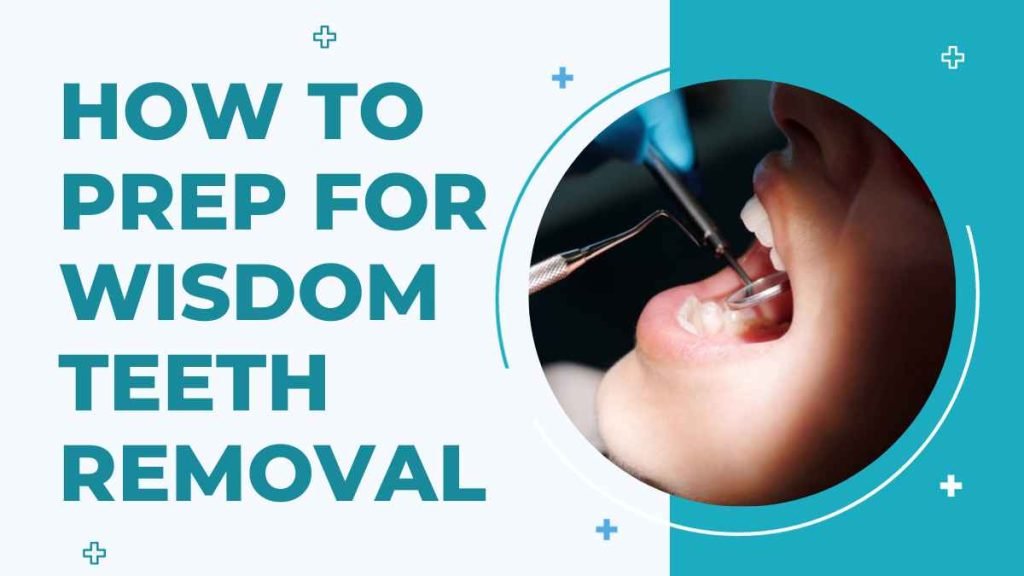How to Prep for Wisdom Teeth Removal! Wisdom teeth removal can be a daunting experience for many, but with the right preparation and knowledge, you can make the process smoother and less intimidating. In this comprehensive guide, we will explore How to Prep for Wisdom Teeth Removal. Here we’ll cover everything you need to know about how to prep for wisdom teeth removal, what to expect during and after the procedure, and more. Let’s dive in!
Table of Contents
Introduction
Wisdom Teeth Removal is a common dental procedure. These third molars often cause discomfort and dental issues due to their late eruption and limited space in the mouth. While the thought of oral surgery may be unsettling, proper preparation and understanding of the process can help ease your concerns.
What is Wisdom Teeth Removal?
Wisdom teeth, also known as third molars, usually emerge between the ages of 17 and 25. Often, they don’t have enough room to grow properly, leading to various dental problems. Wisdom teeth removal is the surgical extraction of these molars to prevent or address issues like overcrowding, misalignment, and infection.
How to Prep for Wisdom Teeth Removal: A Step-by-Step Guide
Proper preparation can make your wisdom teeth removal experience much smoother. Here’s a step-by-step guide to help you get ready:
Total Time: 7 minutes
Consultation with a Dentist or Oral Surgeon
Before the procedure, consult with a dentist or oral surgeon. They will assess your oral health, evaluate the position of your wisdom teeth, and discuss the details of the surgery with you.
Understand the Procedure
Ask your dentist or oral surgeon to explain the wisdom teeth removal procedure, including the type of anesthesia used and the expected duration of the surgery. Understanding what to expect can reduce anxiety.
Plan for Transportation
Arrange for someone to drive you to and from the appointment, as you might be under the influence of anesthesia and unable to drive yourself.
Stock Up on Supplies
Before your surgery, make sure you have soft foods, pain medication, ice packs, gauze, and a comfortable recovery spot at home.
Follow Pre-Op Instructions
Your dentist will provide you with pre-operative instructions, which may include fasting for a certain period before the surgery and not drinking water.
Dress Comfortably
Wear loose, comfortable clothing on the day of the procedure to ensure you’re relaxed during your visit.
Why Wisdom Teeth Removal is Necessary
The extraction of wisdom teeth is necessary for several reasons. They can:
- Cause Pain and Discomfort: Impacted wisdom teeth can lead to significant pain and discomfort.
- Tooth Crowding: Wisdom teeth may cause overcrowding, pushing adjacent teeth out of alignment.
- Infection: Due to their location, they are prone to infection, leading to swelling, pain, and difficulty in opening the mouth.

What Happens After Wisdom Teeth Removal?
Understanding what happens after the removal is crucial for a smooth recovery.
Recovery and Outlook
The recovery period after wisdom teeth removal can vary, but typically, you can expect:
- Swelling: Swelling around the jawline is common and usually subsides within a few days.
- Pain: Pain and discomfort can be managed with prescribed or over-the-counter pain relievers.
- Diet: Stick to soft foods like yogurt, mashed potatoes, and soup for the first few days.
- Oral Hygiene: Gently rinse your mouth with warm saltwater to keep the surgical sites clean.
What Can I Eat After My Wisdom Teeth Removal?
Your diet plays a crucial role in your recovery. Stick to soft and easy-to-chew foods to avoid irritation and discomfort.
Recommended Foods
- Mashed Potatoes: Easy to swallow and soothing.
- Yogurt: A great source of nutrients and easy on the mouth.
- Applesauce: Provides vitamins without the need for chewing.
- Soup: Warm, comforting, and nourishing.
Foods to Avoid
- Crunchy Snacks: Chips, popcorn, and nuts can damage the surgical sites.
- Spicy or Acidic Foods: These can cause irritation and discomfort.
- Straws: Using straws can lead to dry sockets, a painful complication.
Risks / Benefits
Risks
While wisdom teeth removal is a common and safe procedure, there are some risks to be aware of:
- Infection: Infection at the surgical site can occur, but it’s treatable with antibiotics.
- Dry Sockets: These painful conditions can develop if the blood clot in the extraction site dislodges.
Benefits
The benefits of wisdom teeth removal include:
- Pain Relief: Removing problematic wisdom teeth can alleviate pain.
- Preventing Complications: It prevents overcrowding, misalignment, and potential infections.
- Improved Oral Health: The procedure can contribute to better overall oral health.
Common Mistakes to Avoid
Avoiding common mistakes can ensure a smoother recovery and better results.
Ignoring Post-Op Instructions: Following your dentist’s post-operative instructions is crucial for a successful recovery.
Smoking: Smoking can slow down the healing process and increase the risk of complications.
Strenuous Activities: Avoid strenuous activities that could increase blood pressure and disrupt the healing process.
Tips and Tricks
Here are some additional tips to make your wisdom teeth removal journey more comfortable:
- Use a Pillow: Placing a soft pillow under your head when sleeping can help reduce swelling.
- Stay Hydrated: Drink plenty of water to prevent dehydration.
- Oral Rinse: Use a gentle saltwater rinse to keep your mouth clean.
Facts About Wisdom Teeth Removal
Let’s explore some interesting facts about wisdom teeth removal:
- An Ancient Problem: Wisdom teeth issues have plagued humans for centuries.
- Not Everyone Needs Removal: Some individuals have sufficient space in their mouths for their wisdom teeth.
- Age Matters: Younger individuals often recover more quickly from the surgery.
Conclusion
In conclusion of How to Prep for Wisdom Teeth Removal, wisdom teeth removal is a common dental procedure that, with proper preparation, can be a manageable experience. Understanding the process, following pre- and post-operative instructions, and making wise dietary choices can help you recover smoothly. If you have concerns or questions about your wisdom teeth, consult with your dentist or oral surgeon to address them. With the right approach, you can ensure a more comfortable and successful wisdom teeth removal. Here you can checkout that How to Treat Burned Gums from Teeth Whitening.
FAQs About How to Prep for Wisdom Teeth Removal
Does wisdom teeth removal hurt?
Wisdom teeth removal is performed under anesthesia, so you won’t feel pain during the procedure. However, you may experience some discomfort and pain during the recovery period.
How long does the recovery process take?
The recovery time varies from person to person, but it typically takes about a week for the initial healing. Complete recovery may take a few weeks.
Can I go back to work or school after the procedure?
It’s advisable to take a day or two off to rest and recover. You can then gradually return to your normal activities.
What are dry sockets, and how can they be prevented?
Dry sockets occur when the blood clot at the extraction site is dislodged. To prevent them, follow your dentist’s post-operative instructions, avoid smoking, and be gentle with your mouth.
Can I brush my teeth after wisdom teeth removal?
You should avoid brushing the surgical sites for the first day or two. After that, you can gently brush your teeth, avoiding the extraction sites.
When can I resume normal eating habits?
You can gradually reintroduce solid foods into your diet as your mouth heals. Start with soft foods and progress to harder textures as you feel comfortable.
What should I do if I experience excessive bleeding or severe pain after the surgery?
If you experience excessive bleeding or severe pain that isn’t relieved by prescribed medications, contact your oral surgeon or dentist immediately. They can assess the situation and provide appropriate care.


